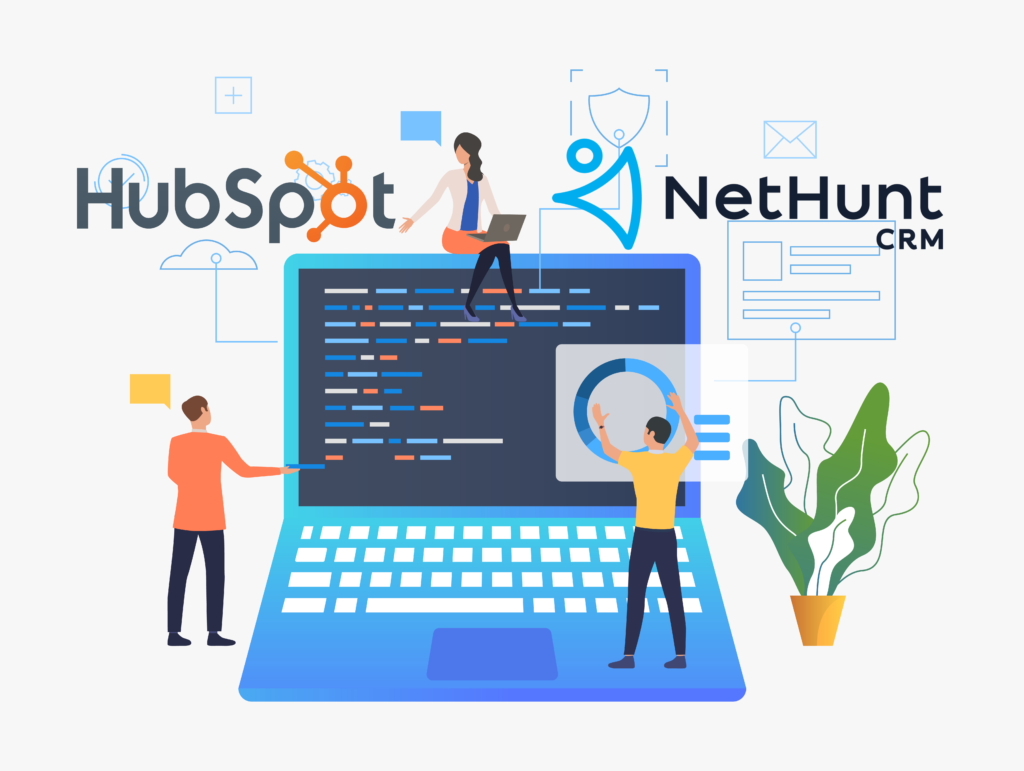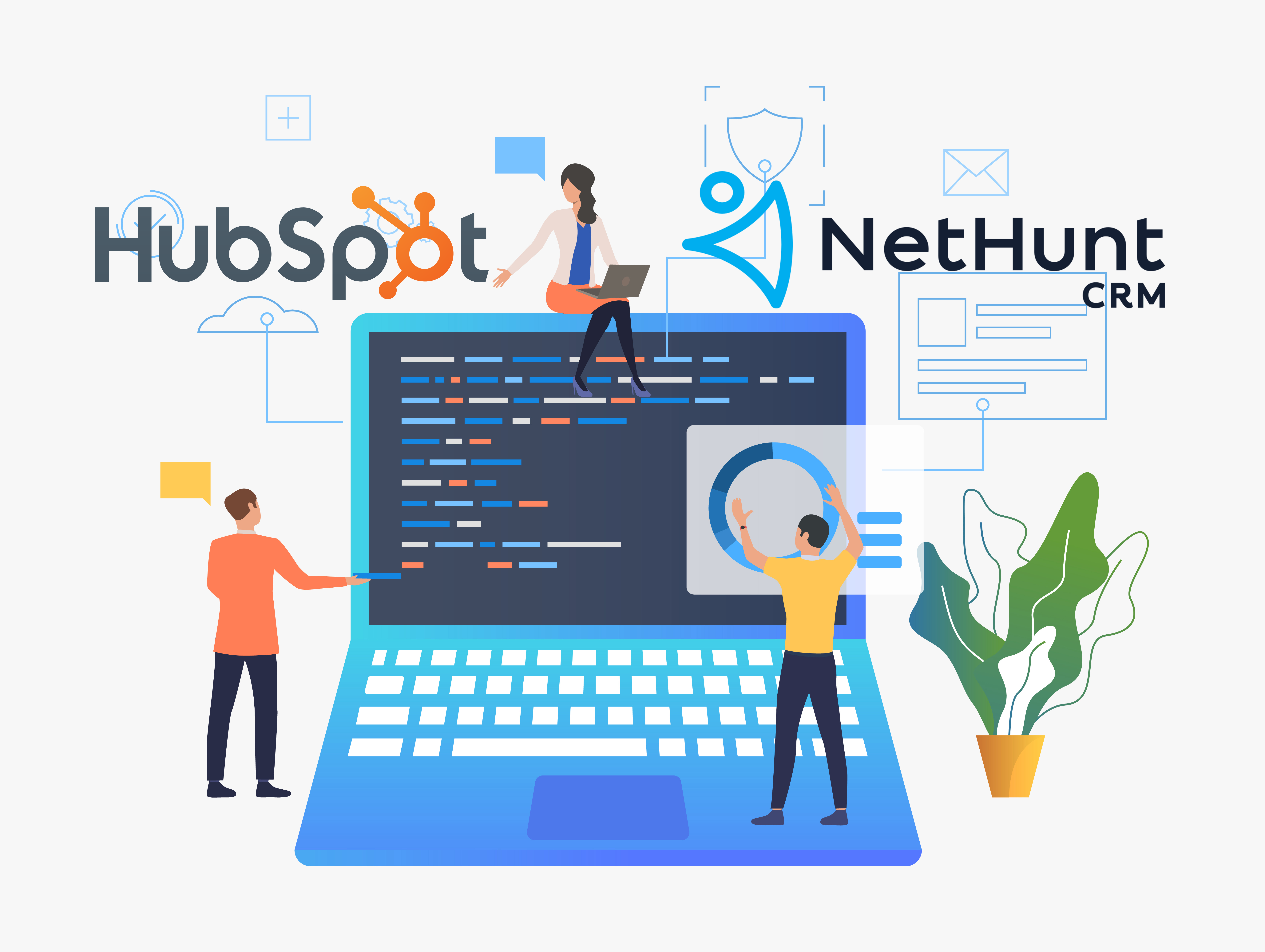When it comes to choosing a CRM (Customer Relationship Management) software, there are a plethora of options available in the market. Two of the most popular CRM solutions are HubSpot and NetHunt CRM. In this article, we will be comparing the features, pricing, and ease of use of both platforms to help you determine which one is best for your business needs.

Overview of HubSpot
HubSpot is a widely popular inbound marketing and sales software that is used by thousands of businesses worldwide. HubSpot provides a range of tools to help businesses grow, including marketing automation, CRM, sales tools, and customer service tools.
Overview of NetHunt CRM
NetHunt CRM is a relatively new player in the CRM market, but it has quickly gained popularity due to its ease of use and affordability. NetHunt CRM is a simple and powerful CRM solution that is specifically designed for small and medium-sized businesses.
HubSpot vs NetHunt: Features Comparison
HubSpot vs NetHunt CRM offer a range of features to help businesses manage their customers and sales processes. Here is a comparison of some of the key features of both platforms:
HubSpot:
• Marketing automation tools
• Lead tracking and scoring
• Email tracking and scheduling
• Sales pipeline management
• Customer service ticketing system
• Reporting and analytics
• Integration with other tools like Salesforce, Gmail, and Outlook
NetHunt CRM:
• Email integration with Gmail
• Contact management
• Sales pipeline management
• Custom fields and tags
• Reporting and analytics
• Mobile app
HubSpot vs NetHunt: Pricing Comparison
Pricing is an important factor to consider when choosing a CRM solution. Here is a comparison of the pricing plans offered by HubSpot vs NetHunt CRM:
HubSpot:
• Free plan – Includes basic CRM, contact management, and limited features
• Starter plan – $50 per month for 1 user, includes more features and marketing tools
• Professional plan – $1,200 per month for 5 users, includes advanced features and marketing tools
• Enterprise plan – $4,200 per month for 10 users, includes more advanced features and dedicated support
NetHunt CRM:
• Professional plan – $24 per user per month, includes basic features and email integration
• Professional+ plan – $48 per user per month, includes more advanced features like custom fields and tags
• Enterprise plan – Custom pricing, includes advanced features like multiple pipelines and integration with other tools
HubSpot vs NetHunt: Ease of Use Comparison
HubSpot vs NetHunt CRM are known for their ease of use, but there are some differences to consider:
HubSpot:
• Requires some technical expertise to set up and configure
• User-friendly interface and intuitive navigation
• Training and support available through the HubSpot Academy
NetHunt CRM:
• Easy to set up and use, even for beginners
• Intuitive interface with drag-and-drop customization
• Customer support available through chat and email
Pros and Cons Comparison
To summarize the pros and cons of each CRM solution, here are some points to consider:
HubSpot:
Pros:
• Comprehensive set of features for marketing, sales, and customer service
• Integration with other popular tools
• Advanced reporting and analytics
Cons:
• Expensive pricing plans for larger teams
• Requires some technical expertise to set up and configure
NetHunt CRM:
Pros:
• Affordable pricing plans for small and medium-sized businesses
• Easy to use and set up, even for beginners
• Email integration with Gmail
Cons:
• Limited features compared to HubSpot
• Limited integration with other tool
Choosing a CRM solution that suits your business needs can be a daunting task. HubSpot vs NetHunt CRM offer a range of features to help businesses
Other Alternative
Simply CRM is a cloud-based customer relationship management (CRM) software that is designed to help businesses manage their customer relationships and sales processes. It offers a range of features and tools that can help businesses streamline their sales processes, track customer interactions, and improve customer engagement.
One of the key features of Simply CRM is its contact management tools. The software allows businesses to store all of their customer information in one central location, making it easy to access and update customer records as needed. Businesses can also segment their customer database based on various criteria, such as demographics, purchase history, and engagement level, allowing them to target specific groups with personalized marketing campaigns.
Simply CRM also offers sales pipeline management tools that allow businesses to track their sales processes from start to finish. The software provides a visual pipeline view of all open deals, allowing businesses to see where each deal is in the sales process and identify potential bottlenecks. This can help businesses prioritize their sales activities and focus on deals that are most likely to close.
In addition to its sales pipeline management tools, Simply CRM also offers marketing automation tools that can help businesses streamline their marketing processes. The software allows businesses to create and send email campaigns, track website visitors, and monitor social media engagement, all from within the platform. This can help businesses improve their customer engagement and drive more leads and sales.
Simply CRM also offers a range of other features, including task management tools, team collaboration tools, and reporting and analytics tools. The software is designed to be easy to use, with a simple and intuitive user interface that requires no technical expertise. It also offers a range of integrations with other popular business tools, such as Zapier, Mailchimp, and QuickBooks.
Overall, Simply CRM is a powerful and versatile CRM software that can help businesses of all sizes manage their customer relationships and sales processes more effectively. Its range of features and intuitive user interface make it a popular choice for businesses looking to improve their customer engagement and drive more sales.




